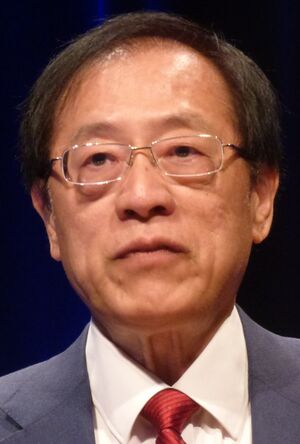أندرو ياو
Andrew Chi-Chih Yao | |||||||||
|---|---|---|---|---|---|---|---|---|---|
姚期智 | |||||||||
 | |||||||||
| وُلِدَ | 24 ديسمبر 1946 | ||||||||
| الجنسية |
| ||||||||
| المدرسة الأم | National Taiwan University (BS) Harvard University (MA, PhD) University of Illinois at Urbana–Champaign (PhD) | ||||||||
| عـُرِف بـ | Yao's Principle | ||||||||
| الزوج | Frances Yao | ||||||||
| الجوائز | Pólya Prize (SIAM) (1987) Knuth Prize (1996) Turing Award (2000) Kyoto Prize (2021) | ||||||||
| السيرة العلمية | |||||||||
| المجالات | Computer science | ||||||||
| الهيئات | Stanford University University of California, Berkeley Princeton University Tsinghua University Chinese University of Hong Kong | ||||||||
| Chinese name | |||||||||
| الصينية | 姚期智 | ||||||||
| |||||||||
Andrew Chi-Chih Yao (الصينية: 姚期智; پنين: Yáo Qīzhì; born December 24, 1946) is a Chinese computer scientist and computational theorist. He is currently a professor and the dean of Institute for Interdisciplinary Information Sciences (IIIS) at Tsinghua University. Yao used the minimax theorem to prove what is now known as Yao's Principle.
Yao was a naturalized U.S. citizen, and worked for many years in the U.S. In 2015, together with Yang Chen-Ning, he renounced his U.S. citizenship and became an academician of the Chinese Academy of Sciences.[1][2][3][4]
النشأة والتعليم
Yao was born in Shanghai, China. He completed his undergraduate education in physics at the National Taiwan University, before completing a Doctor of Philosophy in physics at Harvard University in 1972, and then a second PhD in computer science from the University of Illinois at Urbana–Champaign in 1975.
Academic career
Yao was an assistant professor at Massachusetts Institute of Technology (1975–1976), assistant professor at Stanford University (1976–1981), and professor at the University of California, Berkeley (1981–1982).[5] From 1982 to 1986, he was a full professor at Stanford University.[6] From 1986 to 2004, Yao was the William and Edna Macaleer Professor of Engineering and Applied Science at Princeton University,[7] where he continued to work on algorithms and complexity. In 2004, Yao became a professor of the Center for Advanced Study, Tsinghua University (CASTU) and the director of the Institute for Theoretical Computer Science (ITCS), Tsinghua University in Beijing. Since 2010, he has served as the Dean of Institute for Interdisciplinary Information Sciences (IIIS) in Tsinghua University. In 2010, he initiated the Conference on Innovations in Theoretical Computer Science (ITCS). Yao is also the Distinguished Professor-at-Large in the Chinese University of Hong Kong.[8]
Awards
In 1996, Yao was awarded the Knuth Prize. Yao also received the Turing Award in 2000, one of the most prestigious awards in computer science, "in recognition of his fundamental contributions to the theory of computation, including the complexity-based theory of pseudorandom number generation, cryptography, and communication complexity".[5] In 2021, Yao received the Kyoto Prize in Advanced Technology.[9]
Yao is a member of U.S. National Academy of Sciences, a fellow of the American Academy of Arts and Sciences, a fellow of the American Association for the Advancement of Science, a fellow of the Association for Computing Machinery,[10] and an academician of Chinese Academy of Sciences. His wife, Frances Yao, is also a theoretical computer scientist.
انظر أيضاً
- Dolev-Yao model
- Garbled circuit
- Hybrid argument
- Yao's Millionaires' Problem
- Yao's principle
- Yao's test
- Yao graph
References
- ^ "Quarterly Publication of Individuals, Who Have Chosen To Expatriate, as Required by Section 6039G". Federal Register. 2015-10-27. Retrieved 22 February 2017.
- ^ "杨振宁、姚期智正式转为中国科学院院士". Xinhua News.
- ^ "Scientists drop U.S. citizenship", Science 355 (6328): 891, March 3, 2017, doi:, PMID 28254889
- ^ McLaughlin, Kathleen (24 February 2017). "Two top Chinese-American scientists have dropped their U.S. citizenship". Science. doi:10.1126/science.aal0823.
CAS released a statement confirming the news but offered no further explanation as to why the two had given up their U.S. citizenship.
- ^ أ ب "Andrew C Yao – A.M. Turing Award Winner". amturing.acm.org. Retrieved 2016-06-12.
- ^ "YaoTree". infolab.stanford.edu. Retrieved 2016-06-12.
- ^ "Andrew Yao". www.cs.princeton.edu. Archived from the original on 2016-08-08. Retrieved 2016-06-12.
- ^ "ITCSC People". www.itcsc.cuhk.edu.hk. Archived from the original on 2016-10-08. Retrieved 2016-06-12.
- ^ Kyoto Prize 2021
- ^ "ACM Fellows–1995". acm.org. Retrieved 10 March 2015.
وصلات خارجية
- Andrew Yao(in صينية) at CASTU
- أندرو ياو at the Mathematics Genealogy Project
- Andrew Chi-Chih Yao في مخدم ببليوگرافيا DBLP
- Short description matches Wikidata
- Articles containing صينية-language text
- مواليد 24 ديسمبر
- مواليد 1946
- شهر الميلاد مختلف في ويكي بيانات
- يوم الميلاد مختلف في ويكي بيانات
- Articles containing Chinese-language text
- Pages with empty portal template
- Articles with صينية-language sources (zh)
- Living people
- 20th-century American scientists
- 20th-century Chinese scientists
- 21st-century American scientists
- 21st-century Chinese scientists
- علماء حاسوب أمريكان
- American emigrants to China
- Chinese computer scientists
- Chinese emigrants to the United States
- Chinese University of Hong Kong people
- 1995 Fellows of the Association for Computing Machinery
- Harvard Graduate School of Arts and Sciences alumni
- International Association for Cryptologic Research fellows
- Knuth Prize laureates
- Members of Academia Sinica
- Members of the Chinese Academy of Sciences
- Foreign associates of the National Academy of Sciences
- National Taiwan University alumni
- Naturalized citizens of the People's Republic of China
- Naturalized citizens of the United States
- Former United States citizens
- Princeton University faculty
- Scientists from Shanghai
- Stanford University Department of Computer Science faculty
- Academic staff of Tsinghua University
- Turing Award laureates
- Grainger College of Engineering alumni
- UC Berkeley College of Engineering faculty
- Kyoto laureates in Advanced Technology